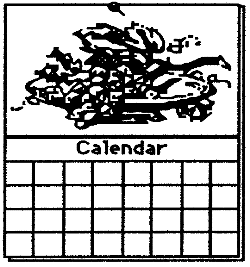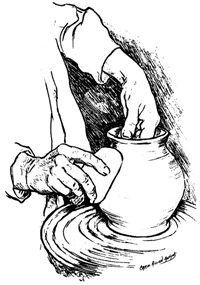Unit 38: The Calendar
カレンダー
The Calendar
カレンダー

All nations have their own ways of saying things about past time and the different historical events important to them.
国家すべてに時間及びそれらにとって重要な異なった歴史的でき事を過ぎて事を約言う自身の方法がある。
Some make reference to the Buddha, some to Mohammed, and so on.
仏への作りの参照、への、そしてそういくつかMohammed 。
It has been very hard to make sense of the historical relations between nations because of the differences between their systems of keeping their records, or calendars.
記録の保存のシステム間の相違のために国家間の歴史的関係の感覚、かずっとカレンダーを作ることは非常に堅い。
The early Egyptians and Babylonians had calendars.
早いエジプト人およびバビロニア人はカレンダーを持っていた。
It is thought by experts in the measurement of time that the invention of the calendar to mark off the years was a very important thing.
それは年に印を付けるカレンダーの発明が非常に重要な事だった時間の測定の専門家によって考えられる。
In countries where talk is in English, historical events have been related to the birth date of Christ.
話が英国のある国では、歴史的でき事にキリストの生年月日と関連していた。
The two main divisions of history are B.C. and A.D.
歴史の2 つの主要な部分はA.D 紀元前にあり。
Time before the birth of Christ is given by B.C..
キリストの生れの前の時間は紀元前に与えられる。
Time after Christ's birth is given by A.D. Those letters are short for two words which are about "the birth of our Lord".
キリストの生れの後の時間はA.D によって与えられる。それらの手紙は"私達の主の生れについて" ある2 ワードのために短い。
Historical records usually have these letters after the year named.
史的記録に通常示される年後のこれらの手紙がある。
Just have in mind that the number of the year gets larger the further you go from the birth of Christ, both before and after.
ちょうど更にキリスト前後に行ったら年の数がより大きくなる心で持ちなさい、両方の生れから。
Each year has 12 months in 4 seasons.
毎年4 季節に12 か月を過す。
The seasons are:
季節は次のとおりである:
Summer, Winter, Autumn and Spring usually said in that order.
夏、冬、秋はその順序で通常前述はね。
The 3 months of each season in Australia are:
毎季節の3 か月は次のとおりである:
| Season
| Early
| Mid
| Late
|
| Summer
夏 | December
12 月 | January
1 月 | February
2 月 |
| Autumn
秋 | March
3 月 | April
4 月 | May
5 月 |
| Winter
冬 | June
6 月 | July
7 月 | August
8 月 |
| Spring
ばね | September
9 月 | October
10 月 | November
11 月 |
Early Summer is in December, mid Summer is in January, late Summer is in February.
Days of the Week
In each month, the weeks are divided into the seven days:
毎月では、週は7 日に分けられる:
日曜日
月曜日
火曜日
水曜日
木曜日
金曜日
土曜日
Each of these days had a religious relation in the early days of English Society, but that is only a matter of interest to you now.
英国の社会の宗教関係当初持たれているこのごろのそれぞれ、しかしそれはあなたへ興味の唯一に問題今である。
If you have some knowledge of these names you will quickly become familiar with the Calendars which show them in the country with which you have connections.
これらの名前の知識を有すればすぐにあなたが関係を有する国でそれらを示すカレンダーに馴染む。
The longest day of the year comes on the 21st/22nd December.
年の最も長い日は12 月21st/22nd に来る。
The shortest on 21st/22nd June;
6 月21st/22nd の最も短いの;
Equal lengths of day and night are on 21st / 22nd of both March and September.
日夜の等しい長さはで3 月21st/22nd 及び9 月両方ある。

In The Potter's Hand
陶工の手
The word which came to Jeremiah from the Lord, saying, Up!
主からJeremiah 、格言に、来た単語!
go down to the potter's house, and there I will let my words come to your ears.
陶工の家に行けば、そこに私は私の単語があなたの耳に来るようにする。
Then I went down to the potter's house, and he was doing his work on the stones.
それから私は陶工の家に行き、彼は石の彼の仕事をしていた。
And when the vessel, which he was forming out of earth, got damaged in the hand of the potter, he made it again into another vessel, as it seemed good to the potter to make it.
そして彼が地球から形作っていた容器が陶工の手で傷つけられて得たときに、彼は別の容器にそれを作ることは陶工によかったようであるので、それを再度作った。
Then the word of the Lord came to me, saying, O Israel, am I not able to do with you as this potter does?
この陶工がようにそれから主の単語、言、O イスラエル共和国は私に、私あなたとされない来たか。
says the Lord.
主を言う。
See, like earth in the potter's hand are you in my hands, O Israel.
陶工の手の地球のように、ある私の手の、O イスラエル共和国見なさい。
Additional Reading
付加的な読書
In 1956 a clever man took a careful look at some old writings imprinted on earthen plates which had been put away carefully in Britain.
1956 年に利発な人は英本国で注意深く置かれた土製の版で捺印されたある古い執筆を注意深い見てみた。
They had been found in Mesopotamia some time earlier and brought to Britain.
彼らはMesopotamia で時間より早い見つけられ、英本国に持って来られた。
They were as hard as stone and were in a very strange form of writing.
それらは石堅く、執筆の非常に奇妙な形態にだった。
Only an expert could say what the meaning of the writing might be.
専門家しか執筆の意味がであるかもしれないもの言うことができない。
They had been made in the times of the wise and holy man, Jeremiah.
それらは賢く、神秘家、Jeremiah の時でなされた。
They were a history of events at that time that was quite separate from the Book of Jeremiah.
それらはJeremiah の本とかなり別のその時にでき事の歴史だった。
The good thing about them is that both they and Jeremiah's sayings are in agreement.
それらについてのよい事は両方とも一致に及びJeremiah の格言あることである。
The potter is given here as a picture of the power of God in making the future of His people.
陶工は彼の人々の未来を作ることの神の力の映像としてここに与えられる。
Jeremiah made use of that idea in saying that the way his nation had to take was complete attention to God's will.
Jeremiah は彼の国家が取らなければならなかった方法が神の意志への完全な関心だった発言のその考えを利用した。
As the potter could make, bring destruction to, and remake the vessel he was forming out of the earth, so the nation could be made or come to destruction.
陶工が作り、破壊をに持って来、容器を作り直すことができるので彼は地球から形作っていた、従って国家はなされか、または破壊に来ることができる。
The necessary thing for the potter was to have the earth he used soft and manageable.
陶工のための必要な事は彼が柔らかさを処理しやすい使用した地球を持つことであり。
Israel was also to be like that.
イスラエル共和国はのようであるまたべきだった。
The trouble was that the nation was doing wrong and the religious leaders were giving them help in the wrong doing.
悩みは国家が間違ってし、宗教リーダーがそれらに間違ったすることの助けを与えていたことだった。
This put Jeremiah in a very serious position.
これは非常に深刻な位置にJeremiah を置いた。
He was responsible to God for giving his countrymen the knowledge of God's purposes for them.
彼はそれらに彼の舎田者に神の目的の知識を与える為に神に責任があった。
But, they did not have any interest in what he had to say.
しかし、それらは彼がならなかったものをの興味を言わなければ持たなかった。
The poor degree of attention they gave to him came about as a response to the complex mixed up situation in which they found themselves.
それらが彼に払った注意の悪い程度は彼らが彼ら自身を見つけた状態の上で混合された複合体への応答として生じた。
The times were very hard.
時は非常に堅かった。
Their small country seemed to be under the control of very powerful nations that lay to the north and to the south of them.
小さい国は北とそれらの南に置く非常に強力な国家の制御の下であることをようである。
They had no respect for the measures Jeremiah said were important for their future.
それらは言われたJeremiah によってが未来の間重要だった手段のための点を有しなかった。
The people let his sayings go by with a laugh or even with a desire for his punishment.
人々は彼の格言が笑いと行くか、または彼の罰のための欲求と均等になるようにした。
He was at times put in prison for the fact that he was God's representative to them.
彼は彼がそれらへ神の代表だったという事実のための刑務所に時々置かれた。
He even went close to losing his life.
彼は彼の生命の損失に近く行った。
There was no harmony between Jeremiah and his countrymen because the times saw a lot of trouble and destruction.
時多くの悩みおよび破壊を見たのでJeremiah と彼の舎田者間にハーモニーがなかった。
The men who are experts on changes in past weather conditions have made the observation that this was a time when every day existence was hard.
天候状態を過ぎて変更の専門家である人はこれが毎日の存在が堅かった時だったこと観察をした。
The weather was gradually getting colder over a very long time and thus food stores were becoming lighter.
天候は次第に非常に長い時間により冷たくなって、こうして食糧店はより軽くなっていた。
Of course, the rhythm of change makes it hard to say things were fixed at any one level.
当然、変更のリズムは事があらゆる1 つのレベルで固定だったことを言うことを堅くする。
But all the nations were taking steps to put their own development first.
しかし自身の開発を最初に置くために国家すべてはステップを踏んでいた。
That led to a lot of competition between them.
それはそれら間の多くの競争をもたらした。
So, Jeremiah lived in important times historically.
そう、Jeremiah は重要な時に歴史的に住んでいた。
His statements were about important facts of everyday life in hard times.
彼の声明はつらい時の日常生活の重要な事実についてあった。
He had a very deep relation to God and to the desires of his nation in times of great need.
彼は大きい必要性の時で神と彼の国家の欲求に非常に深い関係を有した。
We may learn a great amount from Jeremiah.
私達はJeremiah からのすばらしい量を学ぶかもしれない。
His sayings under those hard conditions seem equally important now as then.
それらの堅い条件の下の彼の格言はそしてとして均等に重要な今にようである。
Above all, he gave attention to the need to have right purposes in all that is done and not to see acts of religion as the only quality that has God's approval.
とりわけ、彼は持つされるそして神の承認がある質だけとして宗教の行為を払ったすべての右の目的を見ない必要性に注意を。
He said that to be right with God it is necessary to be as manageable as soft earth in the potter's hand.
彼はそれ神と右であることは陶工の手の地球処理しやすくて必要静かにであると言った。
Helpful Notes
有用なノート
| potter's house
陶工の家 | the place where earth was made into useful vessels.
地球が有用な容器になされた場所。 |
| work on the stones
石の仕事 | the potter worked on a stone wheel.
陶工は石造りの車輪に取り組んだ。 |
| earthen plates
土製の版 | these were made use of for early records.
これらは早い記録のために利用された。 |
| strange form of writing
執筆の奇妙な形態 | the marks used for an early language.
早い言語に使用する印。 |
| rhythm of change
変更のリズム | good or bad reactions coming one after another.
次々に来るよくか悪い反作用。 |
| manageable as soft earth
柔らかい地球として処理しやすい | ready adjustment .
準備ができた調節。 |